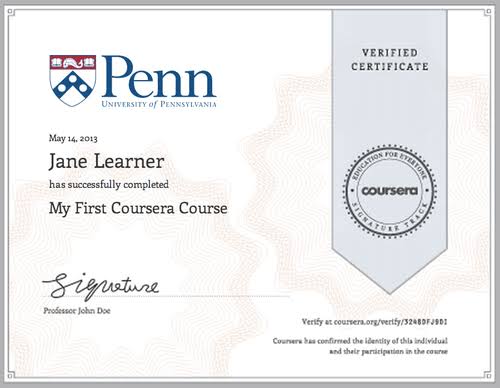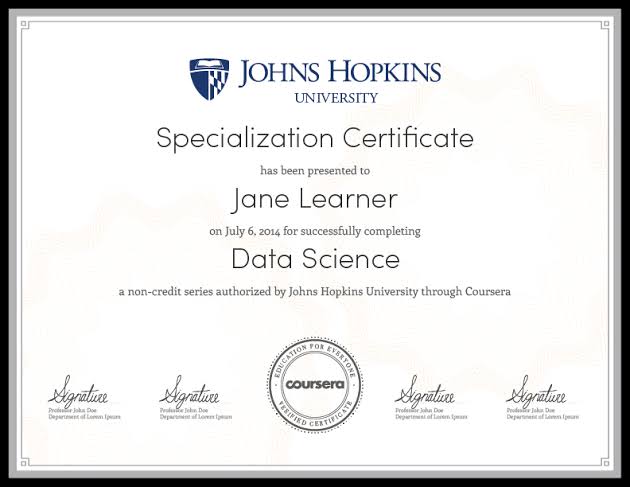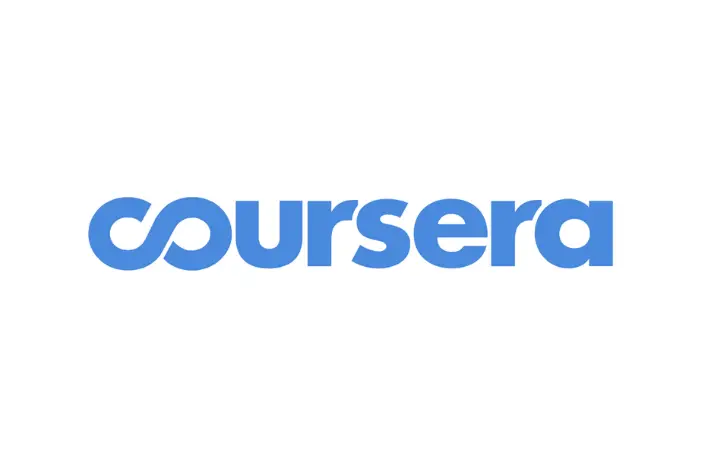A highly popular MOOC, Coursera is a household name for online learning. It has an extensive selection of online courses offered by the best universities in the world.
This review will look at how Coursera works, pricing, and many other areas to give you a complete understanding of this online education provider.
But first, here’s a quick look at its pros and cons.
Pros:
- Courses and degrees are accredited
- High-quality course content
- Fees are lower compared to traditional institutions
- Tons of courses free to audit
Cons:
- Variation of courses can be a bit overwhelming
Learning from home is by no means new to the scene, but you’ll have to admit that it has gone up several notches recently.
One of the platforms leading this charge is Coursera. Coursera is a Massive Open Online Course (MOOC) provider. MOOCs are affordable online courses that are easily assessable and aimed at unlimited participation.
MOOC platforms, such as Coursera, offer these courses with little to no barriers to participation. They provide an avenue for learners from all sorts of backgrounds worldwide.
Universities and organizations deliver these courses on a wide range of topics and to students with a wide range of knowledge.
Coursera is a leading MOOC platform that gathers courses from several world-renowned universities, institutes, and companies.
It partners with top universities like the University of Michigan, Yale, and Stanford. Its partners also include leading firms like Google and IBM.
Coursera is a massive online education company. The COVID-19 pandemic only saw it experience even more widespread growth.
According to the Impact Report released by Coursera in 2020, the company saw more than 21 million new students join up from March to September, a 353% increase.
In that time, the MOOC platform also saw more than 50 million course enrollments, a 444% increase in numbers. As you can imagine, that figure has grown even higher.
The platform is also massive in terms of finances and valuation. According to Forbes, the company is reportedly valued at around $2.5 billion after raising $130 million in its latest round of funding. The total capital raised by Coursera stands at $464 million.
Categories of Courses Offered by Coursera
The courses that Coursera offers cover a wide range of subject areas. These areas are:
- Arts and Humanities
- Business
- Computer Science
- Data Science
- Information Technology
- Health
- Math and Logic
- Personal Development
- Physical Science and Engineering
- Social Sciences
- Language Learning
Each of these subject areas is further divided into smaller scopes. Generally, the courses that you take on Coursera, independent of the subject area, fall under one of these:
Single Courses
You can take single courses on Coursera without enrolling in and completing a Specialization. More on Specializations soon.
Some other courses do not fall under Specializations and are stand-alone. You can enroll in these courses and complete them for several days or weeks.
Single or stand-alone courses on Coursera are available for every subject area. You can get a certificate for a single course if you decide to pay for one.
More than 150 institutions offer upwards of 4000 courses on Coursera. They are all fully accredited by universities and are more respected across the board than those offered by many other MOOC platforms.

Guided Projects
With Coursera’s Guided Projects, you can learn job-relevant skills in 2 hours or under. This is facilitated through an interactive experience that an expert delivers.
Guided Projects offer a hands-on learning experience for skills in various subject areas, including technology, health, business, and data science.
Coursera currently offers more than 380 Guided Projects on its platform. They are great for the online learning experience, as they facilitate immediate practical applications of the learned skills.
Specializations
Coursera Specializations are related courses designed to help learners master a particular topic. Specializations function the same way as a curriculum, with different courses following each other.
For example, one of Coursera’s most popular Specializations is Deep Learning. It is an intermediate-level Specialization that takes about 4 months to complete.
Deep Learning has a series of 5 different courses. Each of these courses can be taken individually, but the consequence is that you will not get a Specialization Certificate when you finish them.
Coursera calls Specializations a raft of courses students can take based on a skill or topic. Specializations are designed to be more rigorous than individual courses and guided projects and take much more time to complete,
To round up a Specialization, learners must submit a Capstone project. This project is peer-reviewed and proves that they have satisfactorily absorbed the courses they were taught.
Although Specializations take longer to complete than individual courses, they take significantly less time than conventional degrees.
Shorter Specializations can be completed within 3-6 months, while longer ones can take as much as a year.

Professional Certificate Programs
Professional Certificates programs on Coursera are programs that allow you to earn a professional certificate from professional institutions such as Google, IBM, or Facebook. These institutions provide the course content for that program.
Professional Certificates are not the same as those you receive for completing any of Coursera’s other product offerings, such as individual courses or Specializations. But they help you get in shape for an in-demand career in a short period.
Currently, there are 15 Professional Certificate programs by Coursera. They include:
- IBM Data Science – IBM
- Google IT Automation with Python – Google
- Data Engineering with Google Cloud – Google
- Applied Project Management – UCI
- SAS Visual Business Analytics – SAS
- IBM Customer Engagement Specialist – IBM
- TESOL – Arizona State University
- Google IT Support – Google
- SAS Programmer – SAS
- IBM AI Engineering – IBM
- IBM Applied AI – IMB
- Cloud Engineering with Google Cloud – Google
- (ISC)2 Systems Security Certified Practitioner (SSCP) – (ISC)2
- IBM z/OS Mainframe Practitioner – IBM
- Cloud Architecture with Google Cloud – Google
Google offers a third of all the Professional Certificate programs, while IBM offers another third. Essentially, these courses are for students interested in starting IT careers in big international corporations.
MasterTrack Certificate Programs
This is Coursera’s version of micro-credential programs. A MasterTrack program is a Coursera program that offers a portion of an actual Master’s program for a cheaper price.
When you enroll in a MasterTrack certificate program on Coursera, you are participating in an online module of a Master’s degree program.
It features interactive, team-based learning combined with live expert instruction and feedback. In addition, the MasterTrack coursework you do can provide credits that count towards your Master’s degree.
The students enrolled in this program work at their own pace, receiving access to real-world projects, virtual office hours, and live sessions.
There are a total of 8 MasterTrack programs available on Coursera. They are:
- Supply Chain Excellence – Rutgers University
- Spatial Data Analysis and Visualization – University of California
- Machine Learning for Analytics – University of Chicago
- Innovation Management and Entrepreneurship – HEC Paris
- Instructional Design – the University of Illinois at Urbana-Champaign
- Big Data – Arizona State University
- Software Engineering – Arizona State University
While the micro-credential courses offered by Coursera come with high-quality content, there is not a lot of variation to them.
Rivals like edX, for example, have a more robust offering. Still, Coursera only introduced the MasterTrack Certificate program in 2018, so they still have time to catch up.
Online Degrees
Coursera has an offering of fully online degrees on offer. There are 16 online degrees, with 14 Master’s degrees and 2 Bachelor’s degrees.
The online Bachelor’s degrees are:
- Online Bachelor’s of Applied Arts and Sciences – University of North Texas
- Online Bachelor’s of Computer Science – University of London
On the other hand, the Master’s degrees offered by Coursera are Online Master’s of:
- Computer Science – Arizona State University
- Public Health – Imperial College London
- Applied Data Science – University of Michigan
- Computer Science in Data Science – University of Illinois
- Innovation and Entrepreneurship – HEC Paris
- Accounting – University of Illinois
- Public Health – University of Michigan
- Business Administration – University of Illinois
- Data Science – HSE
- Global Business Administration – Macquarie University
- Software Engineering (in Spanish) – Universidad de Los Andes
- Electrical Engineering – University of Colorado Boulder
- Computer Information technology – Penn Engineering
- Data Science – University of Colorado Boulder
All of the online degrees offered by Coursera are fully accredited and recognized internationally.
Also, you can expect the same level of knowledge as you would get from a traditional brick-and-mortar university, but at a fraction of the price.
Auditing for Free
Many online courses offered by Coursera are free to audit. That means that anybody can access the course resources free of charge.
This presents an excellent opportunity for people who could not afford to pay for a course to do so without breaking the bank. The downside to auditing Coursera courses is that you do not get a certificate at the end.
Certificates are exclusive to paying students. Therefore, if you prefer that the knowledge you learn count towards your resume, you should consider paying.
Auditing for free also means you are not eligible to participate in the quizzes and assignments built into these courses.
These features can provide valuable feedback to let you know how well you are doing in the course. The absence of either feature can be an issue.
Pricing
Individual Courses
The prices for individual courses on Coursera start at $49 and rise to about $100 per course.
You can apply for financial aid if you need a certificate but find the pricing too expensive for you. You can also audit part of a course for free for a while before deciding if it will be worth the money.
Guided Projects
Guided projects are much cheaper and start at $9.99. This is because of the time required to complete a guided project. Learners can complete guided projects in 2 hours or less.
Specializations
Specializations run on a monthly subscription basis and cost anywhere between $39-$79 per month. Most Specializations have a 7-day free trial, so you have the time to decide on whether or not to commit.
The plus side to subscribing to Specializations instead of paying for individual courses is that you can take them as fast as you want, to save money.
For example, say a Specialization would run for 4 months if you learned an hour a day. You could reduce the time to 2 months by studying 2 hours a day instead.
Professional Certificates
Most Professional Certificate programs use the subscription model like Specializations. Their prices range from $39 to $79 per month.
The price for the Applied Project Management Professional certification by UCI varies wildly. It has a fixed price and costs $2,980.
MasterTrack, Bacherlor’s, and Master’s Degrees
MasterTrack Certificate programs, on the other hand, cost between $2,000 to $4,500. You have the option to spread the cost of some of these programs over several months.
This would make coughing up the money for them easier. Also, they may have funding and scholarship options available for potential students. Online Bachelor’s and Master’s degrees cost anywhere from $15,000 to $25,000.
While these look very expensive, they are only a fraction of what you would be required to pay in a traditional brick-and-mortar university. There are also scholarships and financial aid available for some of the courses.
Coursera Plus
In February 2020, Coursera introduced a subscription service called Coursera Plus. This yearly subscription model grants unlimited access to 3000+ courses, guided projects, Specializations, and Professional Courses. It costs $399 per year and has a 14-day money-back guarantee attached.
Coursera for Business
Apart from learning for individuals, Coursera also caters to businesses. Coursera for Business is a corporate online service from Coursera that is designed for training the workforce in firms and organizations.
This product is excellent for learning by teams of people in small, medium, and large businesses and enterprises. There are two plans here: Coursera for Teams and Coursera for Enterprise, depending on the business size.
Coursera for Business grants access to more than 3,800 courses and guided projects. It comes with certificates for each participant.
FAQs
Is Coursera worth it?
Yes. Coursera is a very highly-rated platform, and for a good reason too. It provides access to high-quality educational content from top universities, institutions, and organizations.
Coursera also represents good value for money with its competitive prices, scholarships, and financial aid offers.
Does Coursera offer accredited courses?
Yes, courses taught on Coursera come with full accreditations by universities. This means that the certificates learners earn when they round up a course are highly valued.
Does Coursera have a refund policy?
Coursera has refund guarantees for some of its products. There are no refunds for month-to-month subscriptions or guided projects.
For individual courses, learners can get a full refund within 14 days of payment, or until the learner earns a certificate, whichever of those happens first. This also applies to Specializations.
Summary
Coursera is a MOOC platform that offers high-quality course content for learners. It has partnerships with some of the top universities and businesses in the world, like Yale University, the University of Michigan, IBM, Google, and Facebook.
The courses offered are generally worth the prices they come with. Coursera is ideal for people who want to boost their careers or education. Do we recommend Coursera? We certainly do.
For more engaging reviews of e-learning and LMS platforms, please check out the #1 resource for edupreneurs.







